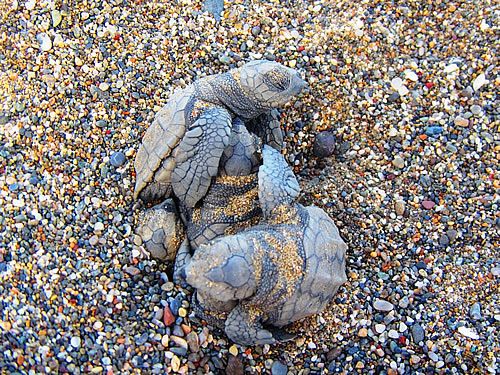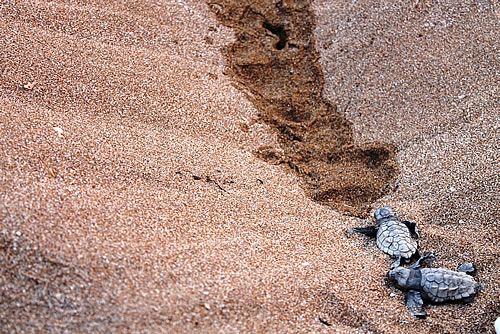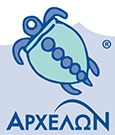Dim the lights for baby turtles
The incubation period in loggerhead nests is approximately 2 months. Then, during the night, hatchlings come out and begin making their way to the sea, guided by the reflection of the moon and stars on the water. Artificial lights from hotels, shops, restaurants and roads confuse and attract the hatchlings. As a result, they get disorientated and move towards the land, where they die.

The first tracks of hatchlings have already appeared on the nesting beaches of Kyparissiakos, Rethymno, Chania, Gytheio, Zakynthos and it seems most of them were successful in reaching the sea.
However, in Kyparissiakos, the newborn hatchlings failed to reach their destination. Due to light pollution in the area, all of them headed towards the opposite direction of the sea and the result was unfortunately fatal. Read the related article here: http://www.archelon.gr/eng/ournews.php?row=row10&nid=997
How can I help?
You can support by asking beach front businesses to dim the lights in order to help the baby sea turtles to find their way to the sea. Also, to continue removing and stacking their sun beds at the end of each day leaving the beach clean, open and free for them.

Ιn case of encountering hatchlings on the beach during the day, keep in mind that water should not be poured over them, nor should they be transported to the sea, as it is crucial that hatchlings walk their way to the sea by themselves. Shading them and leveling the sand in front of them until they reach the sea are the only things humans should do at this point.
Support us by adopting a hatchling here!
MEDITERRANEAN SEA TURTLES: their fate depends on the continuation of ongoing conservation measures
In Sekania the first loggerhead sea turtle hatchlings in the National Marine Park of Zakynthos this year
RECENT NEWS
- OUR NEWS24/02/2026
32 Years Returning to Nest: A Record Reproductive Lifespan for the Loggerhead Sea Turtle in Kyparissia Bay
When we analyzed the turtles’ codes, we realized that this was a turtle that had been tagged for the first time in the area 32 years ago! Specifically, turtle P4849 was tagged on July 7, 1993 and today is the turtle with the longest documented reproductive lifespan in Kyparissia Bay!
- OUR NEWS18/02/2026
"The Mediterranean We Protect" ARCHELON Presented the 2025 Results and the New LIFE MareNatura Exhibition
The presentation of our Accounts for 2025 was held with great success on Saturday, February 14th in Glyfada, honoring the people who are on the front lines for the protection of the Mediterranean.
- OUR NEWS11/02/2026
ARCHELON in the Lakonikos Bay: Nature, Research, Volunteering
The year 2025 was a milestone: a total of 1,253 nests were recorded and protected, while 7 female turtles were equipped with satellite transmitters, sending valuable data about their journeys across the Mediterranean.
- OUR NEWS23/01/2026
A turtle we treated 10 years ago was found in Spain!
“Castello” is a male Loggerhead turtle that was treated at our Rescue Centre in 2015. In 2025 he was found again at a Rescue Centre in Spain!
- OUR NEWS02/01/2026
Against All Odds: A Story of Marine Resilience from Amvrakikos Gulf
One turtle has been surviving for at least six years without a lower jaw!
- OUR NEWS29/12/2025
“Meetings with Remarkable Animals” A Heartwarming Reward for Our Efforts
Kristi Stassinopoulou shared with us a very personal moment: a sketch and a few pages from her book “Meetings with Remarkable Animals"
- OUR NEWS17/12/2025
ARCHELON’s Research: Expanding the Map of Mediterranean Green Turtles
In recent years, some green turtle nests have been recorded in Greece, indicating that the geographical spread of this species’ nesting areas in the Mediterranean is beginning to expand.
- OUR NEWS12/12/2025
The Power Behind Sea Turtle Conservation: Our 2025 Field Leaders
With deep gratitude, we honor all the Field Leaders who contributed to the success of the 2025 Field Projects.
- OUR NEWS10/12/2025
Unprecedented appearance of Leatherback Turtle on a Mediterranean beach
A new scientific record brings to light an extremely rare event for the marine life of the Mediterranean: the first confirmed appearance of an adult Leatherback Turtle (Dermochelys coriacea) attempting to nest in the Mediterranean basin.
- OUR NEWS08/12/2025
Applications Now Open for 2026 ARCHELON Field Leaders Posts!
ARCHELON is pleased to announce that applications are now open for the 2026 Field Leader positions across all nesting projects (applications open until January 31st).
- OUR NEWS05/12/2025
Saving Sea Turtles Together – A Tribute to Volunteers
On Volunteer Day, we take a moment to celebrate all those who came from near and far, put on the blue T-shirt, and embraced this important responsibility.
- OUR NEWS01/12/2025
Laganas Bay, Zakynthos: Successful Loggerhead Reproduction, Ongoing Habitat Problems
On the beaches of the Zakynthos National Marine Park, around 2,155 turtle nests successfully hatched thanks to active protection measures, but human pressures on coastal and marine habitats continue.
- OUR NEWS26/11/2025
A Second Chance: Two Loggerhead Sea Turtles Return to the Sea Thanks to Dedicated Rescues
This summer, two adult loggerhead sea turtles, ‘Aktaia’ and ‘Herbert’, arrived at ARCHELON’s Sea Turtle Rescue Centre needing urgent help after sustaining severe head injuries.
- OUR NEWS11/11/2025
Volunteering Projects 2026: Sea Turtles Need You, the Planet Needs Us!
ARCHELON welcomes volunteers from all over the world and of all ages (over 18) and no prior experience is required! If you speak English, are at least 18 years old, and are in good physical condition, you can do this!
- OUR NEWS10/11/2025
Outstanding Recognition for ARCHELON at the Effective Dialogue Conference 2025
On Thursday, November 6, 2025, ARCHELON received an honorary distinction for its substantial contribution to effective dialogue on sustainability, social responsibility, and the environment


